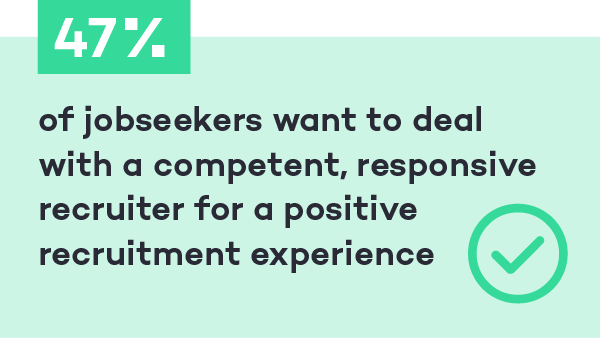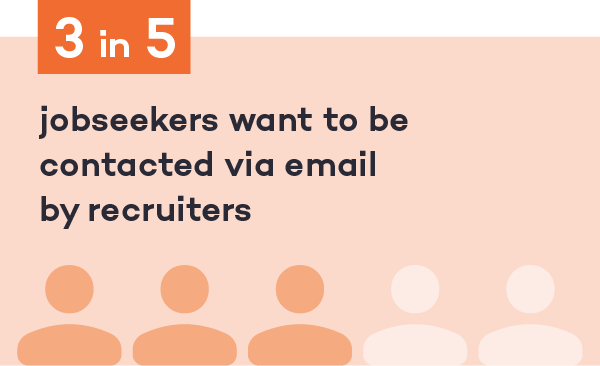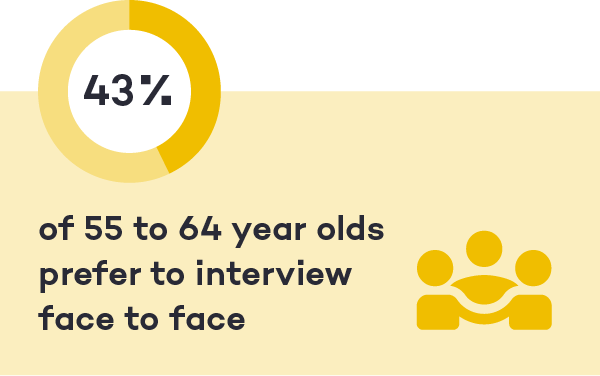
How to create a positive candidate experience during the hiring process
Table of Contents
- Key findings
- What makes a good experience
- Tips for a positive experience
- About the research
First impressions matter, which greatly applies to recruitment. For candidates, it can result in landing their dream job, and recruiters can hire the ideal candidate for the role.
Since recruiters and hiring managers oversee the recruitment journey, they need to ensure candidates are on the same page with their potential employers from the start. From the language used in the job description to the final interview, recruiters can optimise the hiring process in many ways.
A great hiring process should reflect the employee value proposition and excite the candidate about the prospect of working for the employer. At the same time, it should consider the candidate experience. A positive candidate experience increases attraction and engagement of candidates throughout the hiring process.
This article outlines the ideal hiring process using the insights we gathered from Totaljobs’ internal database. We surveyed 2,057 people over the age of 18 and residing in the UK, including unemployed, full-time, and part-time employed jobseekers.
Key findings
- Application stage: 2 in 5 jobseekers (37%) expect confirmation after applying.
- Communication: 3 in 5 jobseekers prefer email contact; fewer want phone calls or texts.
- Interviews: Preferences split across face-to-face, remote, and hybrid; older candidates favour in-person interviews.
- Timelines: Nearly 9 in 10 jobseekers (86%) expect screening, interviews and job decisions within a week.
- Offer rejections: Younger and entry-level candidates are most likely to decline offers after a negative experience
In addition to younger people; those living in Greater London, those with Doctorates, in full-time employment or in higher income brackets are also more likely to decline a job offer due to a negative experience.
Interestingly, the type of industry also makes a difference regarding accepting or declining an attractive offer due to the hiring process. Those in marketing, business management, cleaning, arts and entertainment are more likely to decline an offer due to a negative candidate experience (33.3%, 28%, 25.6%, and 25% respectively).
Differences between a negative and a positive candidate experience

By far, the most important thing for jobseekers is dealing with a competent and responsive recruiter or hiring manager. Almost half (46.8%) of the respondents think it’s the cornerstone of a positive candidate experience.
That’s why, it’s important to train hiring managers and recruiters on managing candidate expectations, managing the hiring process in a timely manner and retaining good communication with the candidates.
Jobseekers also expect transparency regarding the role (41.2%), feedback after a selection step (30.8%), an attentive recruiter or hiring manager who is interested in them (27.9%), a timely decision process where candidates get notified about the final decision within one week (21.7%), not having to fill lengthy forms (19.8%), and a timely interview process with maximum two stages (19.2%).
When asked about what caused a negative candidate experience, respondents said; receiving no feedback after a selection step (39.1%), an unresponsive recruiter/hiring manager (36.6%), disinterested recruiter/hiring manager (28.3%) were the top causes.
Giving interview feedback is a great way to make sure candidates apply again in the future for more suitable roles. It protects the employer brand and ensures an active talent pool gets maintained.
Timeliness was another big part of respondents’ idea of a negative recruitment experience.
Jobseekers found that; filling out lengthy forms (24.9%), too much time in between applying and getting notified about shortlisting (24.8%), too much time in between being interviewed and being notified of whether you got the job (22.7%), interview process being untimely (i.e., too many rounds of interviewing or interview(s) exceeding the time limit (21.8%) decreased their chances of accepting an otherwise attractive offer.
Tips for creating a positive candidate experience

Maintain good communication with candidates
Validating an application is the first step to building a positive candidate experience. Strong candidate communication – whether through your ATS or personal outreach – helps keep applicants informed and engaged
Email was generally the chosen method of communication by jobseekers.
Candidates who pass through the screening process want to be notified by either an email or a phone call. Equally, providing feedback to candidates can still ensure a positive experience even when the candidate doesn’t make it to the next stage.

Humanise the recruitment process
Many candidates still prefer to be interviewed face to face, so it’s important to try and incorporate this into the recruitment process.
Using a mix of video interviews and face to face interviews increase your chances to retain talent in the hiring process. Candidates also expect honesty and transparency about the role, and an approach that doesn’t oversell the job. So, a competent and responsive hiring manager is highly favoured by candidates.
Put emphasis on speeding up the hiring process
According to our latest Hiring Trends Index, lengthy hiring time is a concern for employers. This study shows that jobseekers agree, highlighting the benefits of reducing time to hire for both candidates and recruiters.
Candidates prefer a process that is quick and timely, where they hear back from the recruiter or hiring manager within a week at the latest.
Taking too long to go back to candidates may result in them dropping out of the process altogether. Practical steps to streamline recruitment are outlined in our article on how to reduce time to hire.
About the research
This survey was conducted by Totaljobs between 13 February – 20 February 2023 internally, using our jobseeker database. The sample consisted of 2,057 respondents who are unemployed, work full time or part time in the UK (aged 18+).
Explore articles
Receive the latest recruitment resources and
advice to boost your hiring
By providing us with your details you agree to our privacy policy and for us to keep you updated with the latest news, events,
and special offers from Totaljobs.






